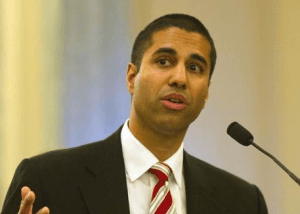
Pai
Republican FCC Commissioners Ajit Pai and Michael O’Rielly are in a hurry to start the merger review clock on Charter Communications’ acquisition of Time Warner Cable while the agency contemplates how to handle access to submitted documents the two companies insist should be confidential.
“We are deeply dismayed that the FCC’s leadership seems unwilling to begin the formal review of the Charter Communications/Time Warner Cable/Bright House Networks transaction until Commissioners agree to change the FCC’s procedures for protecting confidential information,” the commissioners said. “We don’t plan to allow this maneuver to deter us from giving careful scrutiny to the important item in front of us, which if adopted, would apply not only to future transactions but all Commission proceedings. Among other things, we believe that the better course would be for the Commission to seek public input on these proposed procedures before moving ahead.”
The FCC has a responsibility to review merger proposals to decide if they are in “the public interest, convenience, and necessity.”

O’Rielly
Part of that process is reviewing proprietary information sent by the applicants, usually with the understanding the information will be kept confidential or released to the public only in redacted form. Competitors can only get a limited view of the documents the FCC reviews in making its decision about a merger, but some have successfully requested limited access to unredacted documents, including contracts the companies have with third-party programmers.
The fact those documents might be shared with competitors like Dish Networks was not acceptable to CBS, Disney, 21st Century Fox, Scripps Networks, Time Warner Inc., and Univision, all fearing competitors would learn confidential pricing information and use it to their advantage during the next round of contract renewal negotiations. Those media companies sued the FCC in the D.C. Court of Appeals and largely won their case.
Now the FCC has to craft new rules to decide what information they can share with competitors and the public. That process has slowed the start of the 180 day clock the FCC uses to review merger deals, and the two minority Republicans serving as commissioners on the FCC are annoyed.
“The agency has access to the relevant documents at issue in this matter and can continue to evaluate the proposed merger….” So let’s start the ‘aspirational’ merger review shot clock and get on with the process,” said Pai and O’Rielly.


 Subscribe
Subscribe